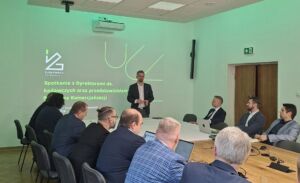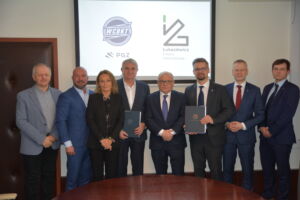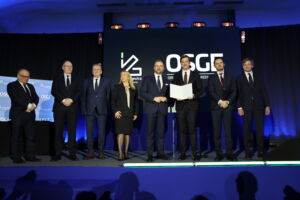We are pleased to inform you that our Hydrogen Technologies and Catalysis Research Laboratory have been seeing a gradual roll-out of test equipment which will soon form a unique fleet of innovative tools to support the growth of the hydrogen fuel technology sector.
With the financial aid from the National Recovery Plan, the Hydrogen Technologies Research Centre commissioned new test instruments, expanding its offer with the latest research techniques. They include:
- Simultaneous DSC-TGA -QMS analyser – A thermal decomposition analysis instrument, capable of simultaneous thermogravimetry operations (TGA for mass change tests) and differential scanning calorimetry (DSC) to enable testing of thermal stability, phase-change analysis, redox reactions, and decomposition processes. This method is designed for physical and chemical analyses of specimen to determine e.g. specific heat capacity, enthalpy of reaction, decomposition temperature, glass transition rate, or hardening (cross-linking), along with crystalline transition rate, moisture content, melting/crystallisation behaviour, solid to solid phase change, polymorphism, oxidation stability, substance purity, and reaction kinetics. This instrument is unique and enables temperature testing in hydrogen gas atmosphere.
- Dylatometr (DIL) – this instrument is for high-precision analysis of dimensional changes in materials with temperature, including the determination of linear thermal expansion coefficient and volume expansion coefficient.
- X-ray diffractometers (XRD) – this instrument enables phase analysis of materials for quantitative and qualitative chemical assays of crystalline substances.
- Ramana – effect microscope – a highly sensitive confocal Raman microspectrometer which enables qualitative and quantitative analysis of specimens, capable of generating spectral maps from large areas of specimens.
- FTIR spectrometer – this is an instrument for Fourier transform infrared spectroscopy with ATR (attenuated total reflectance) sampling for IR testing of solids, powders, foil, pastes, liquids, and ultra-thin layers in semiconductors or metallic materials. This testing technique enables identification of substances, detection of contaminants in materials, determination of chemical reaction pathways and changes in materials.
Contact us to discuss your service opportunities!



